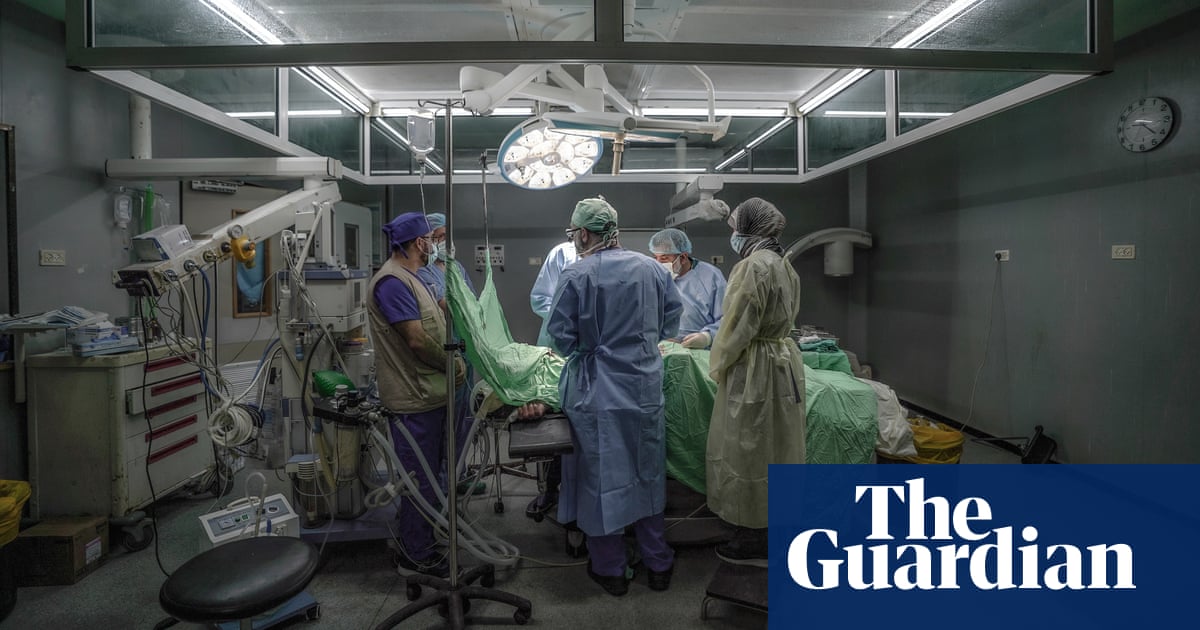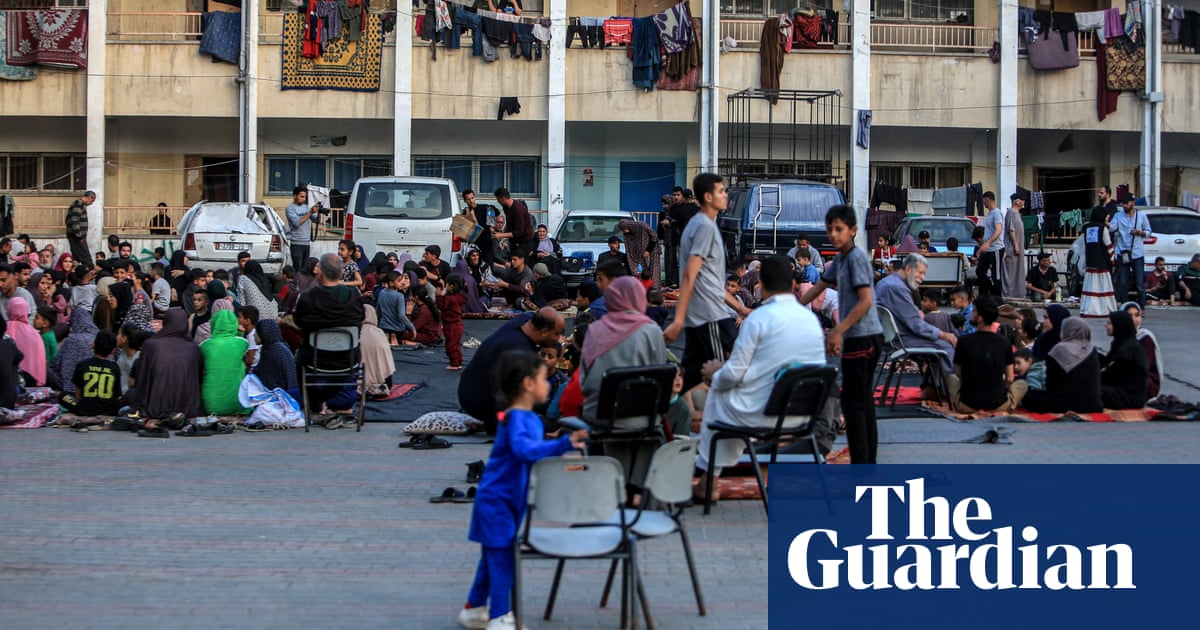
Prof Nick Maynard was operating on a patient with abdomen and chest bomb injuries when an Israeli missile struck the al-Aqsa hospital’s intensive care unit in the adjacent building, forcing his medical emergency team to withdraw from Gaza days earlier than scheduled.
“I’ve witnessed with my own eyes an attack by the Israel Defense Forces on the intensive care unit there,” said Maynard, who works as a surgeon in Oxford and has been travelling to Gaza since 2010.
The Guardian spoke to volunteer healthcare workers from the UK who have travelled to Gaza with aid organisations since 7 October who claimed the Israeli military was deliberately targeting healthcare infrastructure. They also expressed concerns about continuing their humanitarian work in Gaza after seven international aid workers, including three Britons, were killed by an Israeli airstrike.
Aid and health workers account for at least 700 of the more than 32,000 people killed in Israel’s assault on Gaza, according to the UN and the Palestinian health ministry. Of Gaza’s 36 hospitals, only 10 are partly functioning, according to the World Health Organization.
Hospitals have been battlegrounds since the start of the Israeli offensive in Gaza, which followed an attack by Hamas in Israel on 7 October that killed 1,200 people, mostly civilians.
The IDF, which has been approached for comment, has previously said that Hamas “systematically” uses hospitals and medical centres to conduct terror activities.
Volunteer medical workers have described a health system on its knees: treating traumatic injuries, many in children, in overwhelmed hospitals with limited resources, staff and nutrition. Hospitals, health workers and patients are protected under international humanitarian law.
“They’ve been deliberately targeting healthcare workers, healthcare vehicles, healthcare buildings since October 7th,” said Maynard, who led a medical emergency team to Gaza in December with Medical Aid for Palestinians (MAP) and the International Rescue Committee.
The IDF chief of staff, Herzi Halevi, said the strike that killed all seven members of a convoy of humanitarian workers from World Central Kitchen was a “mistake” after a misidentification at night. In the UK, the airstrike has drawn intense scrutiny over the government’s decision to continue arming Israel.
“I’m in no doubt in my mind this is just yet another example of a deliberate targeting of healthcare professionals and healthcare vehicles,” said Maynard.
In January, after Maynard’s team had left and was followed by another, an Israeli airstrike hit their accommodation compound in al-Mawasi, injuring a number of team members and the compound’s security guard.
At a press briefing on Wednesday, the WHO director general, Tedros Adhanom Ghebreyesus, said he was “horrified” by the killing of the seven humanitarian workers, adding he was also “appalled” that al-Shifa hospital had been put out of action after a two-week military siege.
The UN condemned the destruction and killing at the hospital, with health workers and patients among those reportedly killed. “At this point, we are no longer discussing availability, accessibility, acceptability and quality of healthcare received in dignity, but the annihilation of any infrastructure capable of providing basic first aid,” the UN human rights office said.
“That level of destruction is unbelievable,” said Dr Abdel Hammad, a transplant surgeon from Liverpool who was working at al-Shifa with a transplant charity in October, before evacuating from Gaza in November. “Because they get away with the first strike on a hospital it became a normal routine in this war.”
Hammad said colleagues at al-Shifa had shared “unbelievable” stories of people and patients left to die. He was told a plastic surgeon, Dr Ahmed Almaqadma, was taken from the hospital with his mother, Yusra, and their bodies were found nearby as forces withdrew.
The IDF described the operation at al-Shifa as one of the most successful of the nearly six-month conflict and cited the killing of 200 militants including senior operatives. The claim they were all militants could not be confirmed.
Since the conflict began, the WHO has verified 906 attacks on healthcare in Gaza, the occupied West Bank, Israel and Lebanon, resulting in 736 deaths and more than 1,000 injuries.
“Hospitals must be respected and protected, they must not be used as battlefields,” said Tedros.
During his first sleepless night in Gaza, Dr James Smith tried to count the continuous thuds from airstrikes. At about 200 he lost count.
“All you would do would be to think, where has that missile dropped? On whom has it landed?” said the 35-year-old emergency doctor from London.
“To be within such close proximity to fire and airstrikes every second of every day was incredibly frightening and to know that the only thing that was keeping us safe was that our location had been supposedly deconflicted with the Israeli military, that was terrifying, frankly.”
The severity of the injuries he encountered during a two-week trip to Gaza at al-Aqsa hospital were unlike anything he had ever seen. One child had a bilateral traumatic amputation, with two remaining limbs heavily mangled. Another child had severe, unsurvivable burns. People died on the floor without their relatives. Others bled to death.
“It’s inconceivable to me that these are not targeted attacks, whether they’re against Palestinian people, whether they’re against healthcare workers, whether they’re against humanitarian workers,” Smith said.
“If you target healthcare workers and if you target the healthcare system and healthcare facilities, you are demonstrating a form of psychological warfare wherein you say nobody and nowhere is safe.”
Dr Deborah Harrington, an obstetrician who works in Oxford and travelled to Gaza with MAP, described an overwhelmed al-Aqsa hospital with “huge” numbers of child casualties from bombings and traumatic injuries. During their time there, she and Smith said a bullet was shot through into the intensive care unit, though neither were present at the time.
Harrington, who has been travelling to Gaza since 2016, described the attacks on hospitals as the “systematic dismantling of the healthcare system”.
“I am ashamed and disgusted that those protections are not afforded to anyone trying to deliver aid but also to civilians,” she said. “Conflict should not be on civilians and it should not be on the people trying to help them.”
Upon arriving at the European public hospital in southern Gaza in February, Dr Konstantina Ilia Karydi and her team were told the hospital had about 1,000 patients for the hospital’s 220-bed capacity before the war. Nearby, more than 22,000 people were sheltering in tents.
“You cannot imagine all the terrible conditions that all these people live under,” said the 43-year-old anaesthetist.
Over two weeks they treated open fractures, reconstructive surgeries, blast or shrapnel injuries and gunshot wounds. Medical masks were washed and reused, she said, and opioids for pain relief were used only in operating rooms. The team limited their movements, remaining inside the hospital after the compound strike in January.
“It’s just impossible that IDF didn’t know who was in the car,” said Karydi of Monday’s airstrike. Aid groups working in Gaza provide the coordinates of their movements to Israeli forces via a system of deconfliction, which operates through the UN.
“You’re targeting humanitarian organisations knowing that they will suspend their operations because they have to,” she said. “What does this mean? You’re trying to scare off people, you’re trying to make them leave.”












